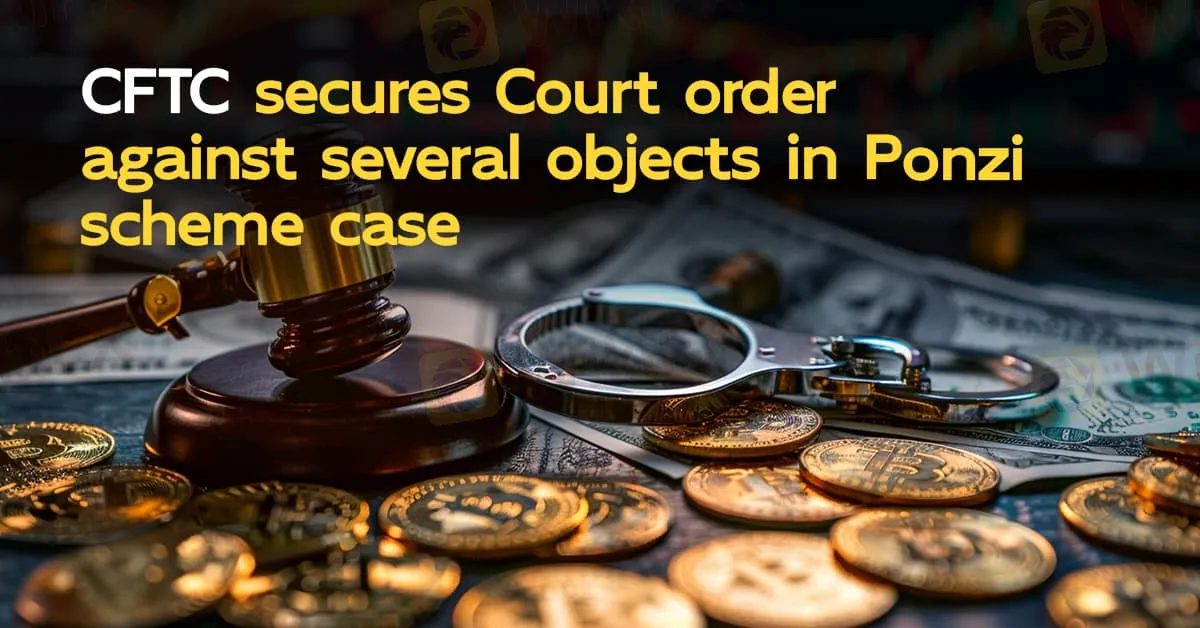简体中文
繁體中文
English
Pусский
日本語
ภาษาไทย
Tiếng Việt
Bahasa Indonesia
Español
हिन्दी
Filippiiniläinen
Français
Deutsch
Português
Türkçe
한국어
العربية
CFTC secures Court order against several objects in Ponzi scheme case
Abstract:The Commodity Futures Trading Commission (CFTC) has achieved a significant legal victory in a case against Sam Ikkurty, Jafia, LLC, Ikkurty Capital, LLC, and related entities. Judge Mary Rowland of the Illinois Northern District Court granted a summary judgment in favor of the CFTC, ruling on all counts of the complaint.

The Commodity Futures Trading Commission (CFTC) has achieved a significant legal victory in a case against Sam Ikkurty, Jafia, LLC, Ikkurty Capital, LLC, and related entities. Judge Mary Rowland of the Illinois Northern District Court granted a summary judgment in favor of the CFTC, ruling on all counts of the complaint.
The court order, announced today, mandates substantial financial repercussions for the defendants. Sam Ikkurty of Oregon, along with Jafia, LLC and Ikkurty Capital, LLC, operating under various names such as Rose City Income Fund I, Rose City Income Fund II, and Seneca Ventures, LLC, faces a combined restitution and disgorgement totaling more than $120.6 million. This includes over $83.7 million in restitution and $36.9 million in disgorgement, jointly and severally.
The judgment stems from allegations that the defendants orchestrated a Ponzi scheme, deceiving investors through false promises and misrepresentations. According to the CFTC, Ikkurty attracted participants through webinars and trade shows, enticing them with guarantees of a 15% annual income from investments in digital asset commodities like Bitcoin and Ethereum, as well as commodity interests.
Judge Rowland's order affirms that these representations were misleading, with Ikkurty failing to deliver any actual profits to investors. Instead, funds were allegedly misappropriated, including through a dubious carbon offset program where promised collateral was not obtained, resulting in significant financial losses for participants.

In addition to the financial penalties, the defendants were found to have violated the Commodity Exchange Act (CEA) and CFTC regulations, including operating as unregistered commodity pool operators. The court emphasized that digital assets like Bitcoin and Ethereum fall under the CFTC's regulatory purview, extending to other virtual currencies such as OHM and Klima.
The CFTC cautioned that while orders for restitution aim to recover lost funds for victims, the complex nature of Ponzi schemes often means that full recovery may not be possible if perpetrators lack sufficient assets.
The outcome underscores the CFTC's commitment to protecting investors and maintaining integrity in commodity markets, signaling a stern stance against fraudulent schemes within the digital asset sector.

Disclaimer:
The views in this article only represent the author's personal views, and do not constitute investment advice on this platform. This platform does not guarantee the accuracy, completeness and timeliness of the information in the article, and will not be liable for any loss caused by the use of or reliance on the information in the article.
Read more

Trader Exposes Unethical Practices by STP Trading
A recent allegation against STP Trading has cast doubt on the firm's business practices, highlighting the potential risks faced by retail traders in an increasingly crowded and competitive market.

What Makes Cross-Border Payments Easier Than Ever?
Cross-border payments are now faster, cheaper, and simpler! Explore fintech, blockchain, and smart solutions to overcome costs, delays, and global payment hurdles.

FCA Identifies Clone Firm Exploiting Admiral Markets' Credibility
The UK Financial Conduct Authority (FCA) has issued a public warning regarding a fraudulent entity impersonating Admiral Markets, a legitimate and authorised trading firm. The clone firm, operating under the name Admiral EU Brokers and the domain Admiraleubrokerz.com, has been falsely presenting itself as an FCA-authorised business.

Malaysian Man Loses RM113,000 in Foreign Currency Investment Scam
A 57-year-old Malaysian man recently fell victim to a fraudulent foreign currency investment scheme, losing RM113,000 in the process. The case was reported to the Commercial Crime Investigation Division in Batu Pahat, which is now investigating the incident.
WikiFX Broker
Latest News
eToro Expands Nationwide Access with New York Launch
Webull Partners with Coinbase to Offer Crypto Futures
Why Is UK Inflation Rising Again Despite Recent Lows?
Hackers Charged for $11M Crypto Theft Using SIM-Swaps
Role of Central Banks in the FX Market
FCA Alerts Against Sydney FX
What Makes Cross-Border Payments Easier Than Ever?
Trader Exposes Unethical Practices by STP Trading
Interactive Brokers Launches Tax-Friendly PEA Accounts in France
Google Warns of New Deepfake Scams and Crypto Fraud
Currency Calculator


